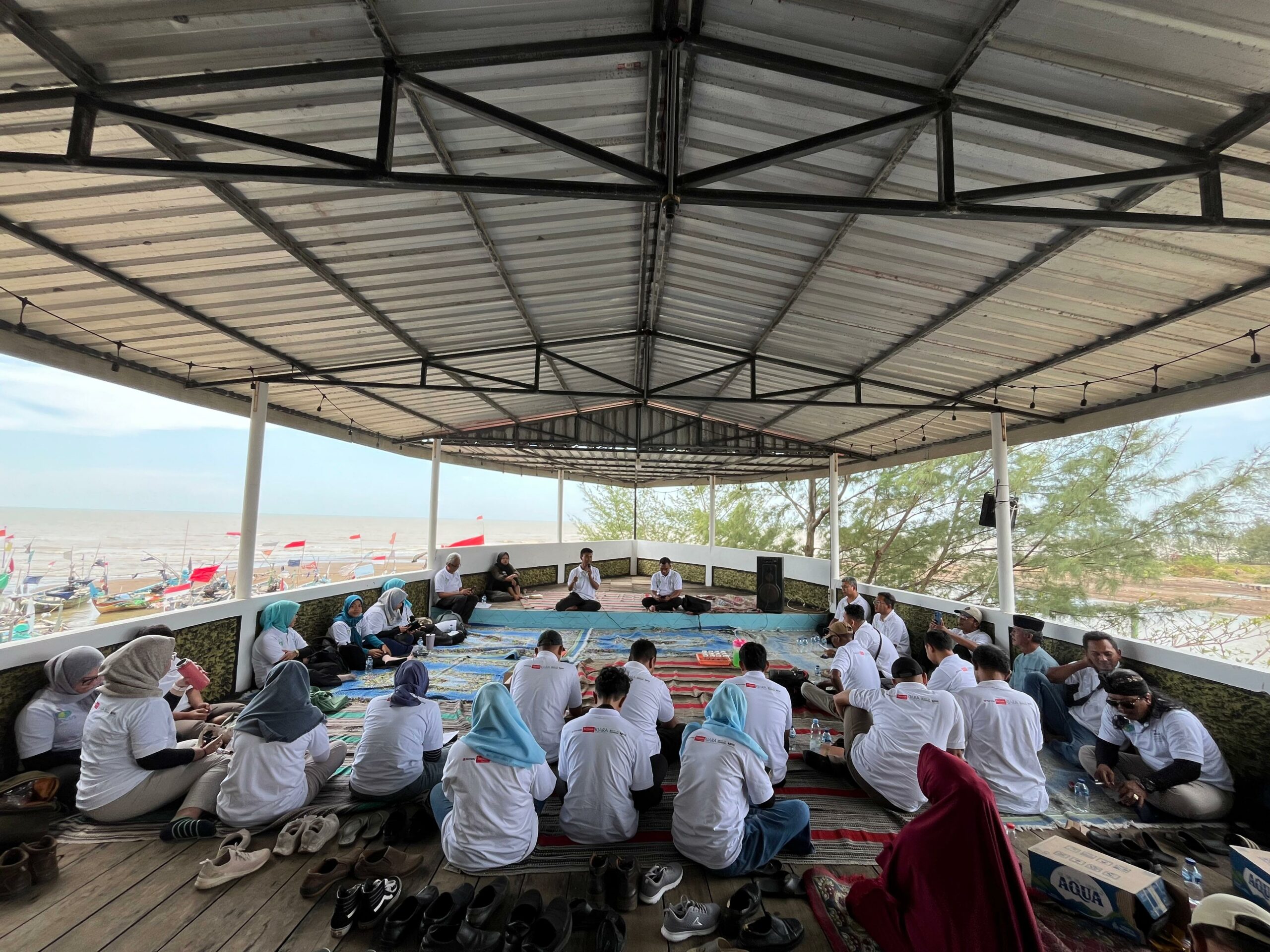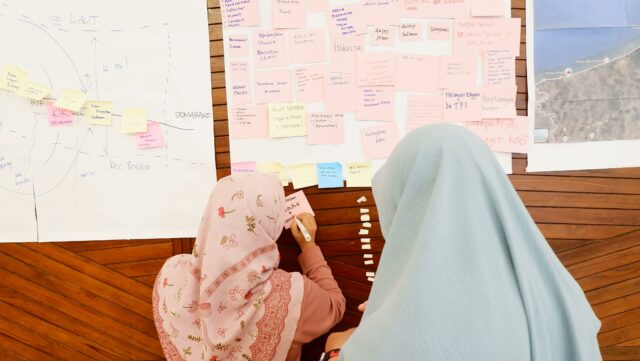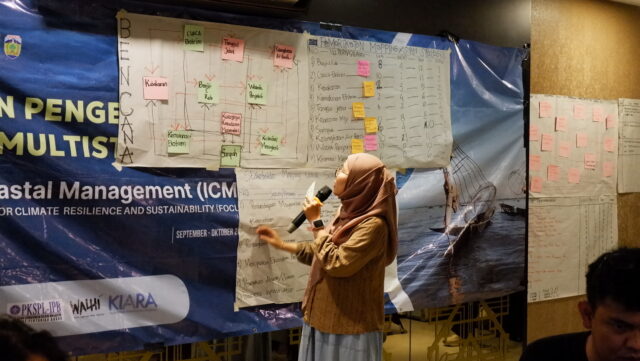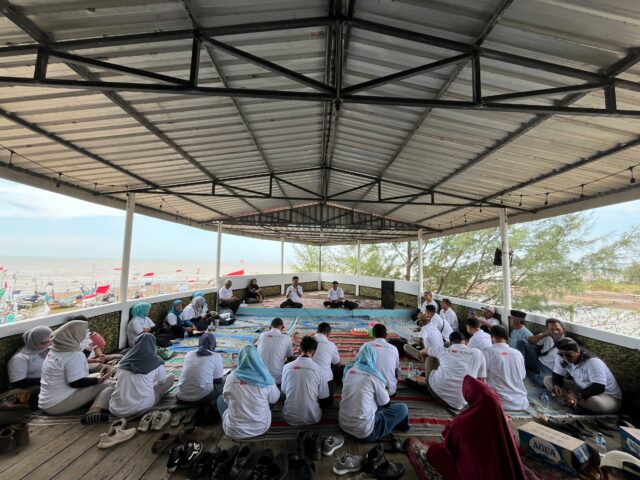
Climate Justice | January 28, 2025
Coastal Management Needs Inclusive Participation
Sutriyatmi and Miranda
The northern coast of Central Java plays a strategic role in provincial economic development; however, it faces significant vulnerability to disasters, particularly the increasing frequency of tidal flooding. Rapid commercial activities and industrial growth, and the impacts of climate change have caused environmental degradation, heightening the region’s vulnerability to disaster risks.
Recognizing the complex challenges and lack of stakeholder coordination in coastal management, the FOCUS consortium conducted an Integrated Coastal Management (ICM) training in the five FOCUS’ target areas: Batang, Kendal, Demak, Jepara regencies, and Semarang City. Held from September to October 2024 and followed by a provincial-level workshop in December, the program involved 143 participants (89 men and 54 women). These participants represented a diverse array of stakeholders, including local governments, fisherfolk groups, fish farmers, seafood processors men and women, youth groups, academics, civil society organizations, and private sector representatives.

Integrated, Not Separate
As defined by the Partnerships in Environmental Management for the Seas of East Asia (PEMSEA), Integrated Coastal Management (ICM) is a governance approach that integrates human behaviour and ecosystem functions to achieve sustainable development within administrative and geographic boundaries.
In simple terms, ICM emphasizes the human behavioural aspects in utilizing and preserving coastal and marine ecosystems. It also encourages the understanding about the interconnectedness of upstream and downstream activities. For example, the Bodri Kuto River flows through Temanggung, Semarang Regency, Semarang City, and Kendal Regency, meaning agricultural, industrial, and household waste in upstream areas can adversely affect downstream ecosystems and communities. Residual agricultural chemicals, for instance, may flow into estuaries, disrupting marine life.
Currently, the northern coast of Central Java has developed into an industrial hub, featuring coal-fired power plants and seawall construction projects. However, the region is more than an economic zone—it is a home for coastal communities deeply connected to their ancestral lands and traditions. This complexity underscores the necessity of integrated management to address overlapping interests and potential conflicts.
Unpacking the FOCUS’ ICM Training
The FOCUS’ ICM training aimed to instill fundamental ICM principles, encouraging participants to view coastal management not as isolated spatial planning but as an interconnected system integrating human and environmental aspects. Healthy coastal and marine ecosystems not only provide food and economic opportunities but also protect against natural disasters.

In the training, participants were asked to jointly assess and identify key issues in their coastal areas. Mangroves ecosystem, found throughout the project areas, are vital for coastal protection against waves, erosion, and storms while also supporting local livelihoods through fisheries and tourism. Damaged mangrove ecosystems directly affect community welfare.
Another pressing issue was pollution, with waste originating from households, industries, and ocean currents. Most villages in the project area lack adequate waste management systems, exacerbating environmental harm.
Access to clean water remains a significant challenge, particularly in areas affected by tidal flooding. Water scarcity impacts community health and disproportionately affects women, specifically their reproductive health. Residents often rely on purchased water, and groundwater extraction which led to land subsidence, worsening flood risks.
Beyond classroom sessions, participants engaged in field visits to observe real coastal conditions and develop context-specific management plans. The Regional Development Planning Agency (Bappeda) of Central Java also provided insights into provincial coastal development strategies.

Through field interviews and observations, participants gathered data on relevant public policies, their implementation, and gaps in addressing coastal issues including budget, stakeholders involved and strategy for sustainability. This collaborative process highlighted the importance of multi-stakeholder partnerships in creating effective, inclusive coastal management plans.
The training also facilitated knowledge exchange and information sharing among stakeholders, including community members, government officials, and academics. This exchange laid the groundwork for forming multi-stakeholder forums and crafting inclusive development programs for the future.
Sustainable coastal management must align with the principles of sustainable development, ensuring no one is left behind in achieving the Sustainable Development Goals (SDGs). Access to information, decision-making processes, and planning spaces must be open to all, enabling meaningful participation from women, youth, and vulnerable groups.
Integrating Gender Equality and Social Inclusion (GESI) perspectives into coastal management is crucial. GESI ensures that vulnerable groups, alongside other stakeholders, can actively and meaningfully contribute their unique needs, ideas, and solutions to development efforts toward a more resilient, equitable, and sustainable future.

